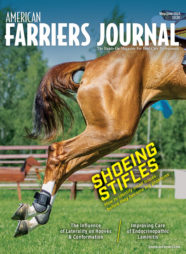The Horseracing Integrity and Safety Authority took another step toward fruition after the appointment of its board of directors and two standing committees.
Board and committee members were reviewed and selected from more than 160 nominations of people from without and outside of the industry. The nominating committee was led by Nancy Cox, the University of Kentucky’s vice president for land-grant engagement and dean of the College of Agriculture, Food and Environment; and Leonard Coleman, former president of the National League of Professional Baseball Clubs and a former member of Churchill Downs Board of Directors.
The nine-member board of directors includes five from outside the Thoroughbred industry and four independent representatives. The two chairs of the authority’s standing committees — racetrack safety and anti-doping and medication control — serve on the board of directors. The chair of the board of directors is expected to be selected at its first meeting. The board members are Coleman; former Kentucky Gov. Steve Beshear; Ellen McClain, former president of the New York Racing Association; Charles Scheeler, a former federal prosecutor; Adolpho Birch, senior vice president of business affairs and chief legal officer for the Tennessee Titans of the National Football League; Joseph De Francis, managing partner of Gainesville Associates; Dr. Susan Stover, professor of surgical and radiological science at the University of California, Davis; Bill Thomason, immediate past president of Keeneland; and DG Van Clief, former president of the Breeders’ Cup and long-time racing executive.
“Over the past several months, the nominating committee carefully reviewed each nominee with a deep and enduring understanding of the importance responsibility entrusted to them in selecting the inaugural board and standing committees of this essential entity charged with standardizing safety in the industry,” Cox says. “Thanks to the time and effort of the committee, we have a diverse board and standing committees with broad expertise who will bring the thoughtfulness and skill needed in implementing the Horseracing Integrity and Safety Act.”
Members of the Anti-Doping and Medication Control Standing Committee are Birch, who chairs the panel; Jeff Novitsky, the Ultimate Fighting Championship’s vice president of athlete health and performance; Kathleen Stroia, senior vice president of sport sciences and medicine and transitions for the Women’s Tennis Association and the WTA’s representative on the board of the Society for Tennis Medicine and Science; Jerry Yon, a retired gastroenterologist and former member of the Kentucky Horse Racing Commisson; Jeff Blea, equine medical director at the University of California, Davis School of Veterinary Medicine; Mary Scollay, executive director and chief operating officer of the Racing Medication and Testing Consortium; and Scott Stanley, professor of analytical chemistry at the University of Kentucky’s Maxwell H. Gluck Equine Research Center and director of the Equine Analytical Chemistry Laboratory.
Members of the Racetrack Safety Standing Committee are Stover, who chairs the panel; Lisa Fortier, the James Law Professor of Surgery, Equine Park Faculty director and associate chair of Graduate Education and Research at the Cornell University College of Veterinary Medicine; Peter Hester, an orthopedic surgeon specializing in sports medicine; Paul Lunn, dean of the College of Veterinary Medicine at North Carolina State University; Carl Mattacola, dean of thee University of North Carolina, Greensboro School of Health and Human Services; Glen Kozak, senior vice president of operations and capital projects for thee New York Racing Association’s facility and track operations; and John Velazquez, North America’s all-time leading money-earning jockey and board member of the Permanently Disabled Jockeys’ Fund and co-chair of the Jockeys’ Guild.
The authority was created by the Horseracing Integrity and Safety Act (HISA) with the mission of preventing horse racing fatalities by establishing anti-doping regulations, penalties and racetrack safety rules.
HISA has met with opposition in the form of two federal lawsuits alleging that the law is unconstitutional. Both lawsuits claim that the Authority is illegal because it delegates legislative authority to a private organization and private individuals. The Authority is responsible for implementing anti-doping and racetrack safety protocols, regulations and penalties. The U.S. Anti-Doping Agency (USADA), a private organization, is enforcing the drug control program. The law, which was passed as part of the Dec. 21, 2020, COVID-19 stimulus bill, was a response from federal lawmakers after a series of doping scandals and equine racetrack fatalities.
The federal government has filed a motion to dismiss the National Horseman’s Benevolent and Protective Association’s lawsuit, arguing that rules, regulations and fees haven’t been established by the Authority, which has yet to meet.
“Plaintiffs jumped the gun bringing this constitutional challenge,” the motion states. “Their complaint questions the validity of a law that currently subjects them to no obligation or penalty. Neither the Federal Trade Commission (FTC) nor the Authority have even proposed rules that they could endeavor to enact.”
Learn More
Horseracing Safety and Integrity Act Faces Another Federal Lawsuit
The legal challenges facing the Horseracing Safety and Integrity Act are mounting after a group consisting of two states, its racing commissions, two equine associations and a breeding farm filed a federal lawsuit alleging that the law is unconstitutional.
Thoroughbred Racing Fatal Injury Rate Falls to an All-Time Low
The risk of fatal injury of Thoroughbred racehorses never has been lower, according to an annual analysis of data from more than 100 tracks in the United States and Canada.
Horseracing Integrity Act has “Constitutional Flaws,” USTA Says
Fresh off of its opposition to legislation that aims to prevent horse racing fatalities by creating anti-doping standards, a harness racing organization is raising questions about its constitutionality.








Post a comment
Report Abusive Comment